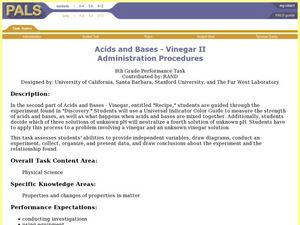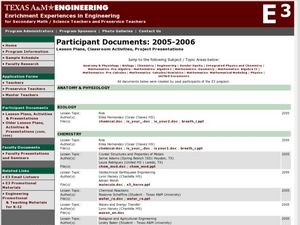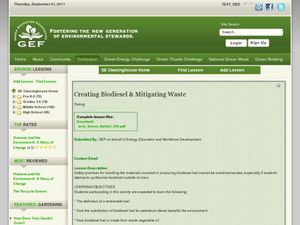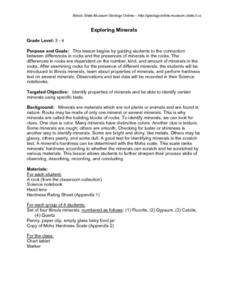Curated OER
Magnets
Second graders classify objects and formulate hypotheses regarding various materials and their magnetic properties. They complete a worksheet and watch a video.
Curated OER
Frozen Solids
Students investigate various properties of ice including melting points and the effect of pressure on ice. They demonstrate how increased pressure lowers the melting point of ice and perform a simple experiment proving that water is more...
Curated OER
Acids and Bases - Vinegar II
Eighth graders experiment what happens when acids and bases are mixed together. In this acids and bases experimental activity, 8th graders decide which of three solutions of unknown pH will neutralize a fourth solution of unknown pH.
Curated OER
Science: Exploration Tubs
First graders develop skills of scientific inquiry. They determine which objects float and which sink.
Curated OER
Volume Lab
How can we find volume if it a shape isn't easy to measure? Investigate methods for determining this as the volume of regular and irregular objects is explored in several stations. Learners discover that when the standard formula for...
Curated OER
How Electronics Come to Us: Distribution and Use
Students identify environmental challenges that can be solved throughout a product's life cycle. They experiment and examine how we can choose and use products in an environmentally responsible manner. Each student is also involved in...
Curated OER
Physical Science Review Questions
Prepare your class for a quiz with these physical science review questions. Learners respond to 7 questions about ionic and covalent bonds, oxidation states, and chemical and physical changes. In addition, they name compounds and balance...
Curated OER
Temperature
Several slides compare different temperature scales. Thermal expansion, heat transfer, and Maxwell speed distribution are also explored. The last two slides seem unrelated to the topic of heat, but are easily left out of this otherwise...
Curated OER
Periodic Table of Fun
Are you looking to put the fun back in the fundamentals of chemistry? Why not have groups create their own periodic tables of something (animals, food, music groups, etc.) practicing the organizational strategies used in the periodic...
Curated OER
Conductors and Insulators
Fifth graders explore conductors and insulators. In this science lesson, 5th graders act as electrons moving through a wire. Students break into groups representing conductors and insulators and explore how they work with electrons.
Curated OER
Magnets are forceful
You could use this worksheet two different ways. As is, or you could have learners actually do the experiment shown. They are to determine which magnet is strongest by counting the number of paper clips hanging from it. Why not get five...
Curated OER
Characteristics of Crystals
In this crystals worksheet, students complete a graphic organizer by filling in the characteristics of the different crystal types including melting/boiling point and electrical conductivity.
Curated OER
What do Atoms Look Like?
In this atom worksheet, high schoolers answer 31 multiple choice questions about the structure of atoms, the periodic table, the reactivity of elements, orbital diagrams and the families of elements.
Curated OER
Analyzing Birds and Planes
Young scholars find a variety of topics and subjects in this lesson. In the math section of this lesson, students graph linear equations and analyze their data. They solve one and two step equations to find the variable.
Curated OER
Creating Biodiesel and Mitigating Waste
Biotechnology pros produce their own biofuel using waste oil and fresh vegetable oil. They test the quality of their product using titration techniques and pH analysis. They write their observations and report their findings. Be aware...
Curated OER
Egyptian Cartouche
Sixth graders demonstrate their knowledge of Earth clay construction by creating, inscribing, and glazing an earth clay Egyptian cartouche. The instructional activity culminates with learners sharing their knowledge of key terms in the...
Curated OER
Charge and Electricity
In this charge and electricity worksheet, learners read about electric charges and how they are created in atoms. They also read about the unit of charge, called the Coulomb, conductors, and insulators. Emerging electricians match 11...
Curated OER
Exploring Minerals
I love this geology lesson plan. Third and fourth graders look at the connections, and the differences, between rocks and minerals. Learners are charged with identifying specific rocks and minerals, learning how to properly use...
Curated OER
The BEAM Project: Building Efficient Architectural Models
Technology or engineering teams are given a task to design, construct, and test the efficiency of a structure that will foster an even temperature throughout an entire sunny day. Intended as a long-term project, pupils research, plan,...
Exploratorium
Diffraction
Kindle knowledge of how light travels by using this activity in your physical science curriculum. By setting up a candle flame or flashlight bulb and viewing it through a slit, observers of light see evidence of its wave characteristic....
University of Texas
Matter and the Periodic Table Chemical Families and Periodic Trends
Is assembling the periodic table as simple as Tetris? Scholars arrange colored cards into a logical order and then make connections to the arrangement of the periodic table. Hands-on activities include adding trend arrows and analyzing...
LABScI
Atomic Structure and the Periodic Table of Elements: The Secret Agent Lab
Food always gets attention! Model atomic structure using fruit loops to represent the subatomic particles. After building models, scholars create ionic bonds using their models. Finally, they use these concepts to create a periodic...
Science Geek
Periodic Table of Elements
Colored boxes with white font present the basic periodic table of elements to your young chemists. All of the basics are included: chemical name, symbol, atomic number, atomic mass, and the number of electrons in each orbital. A brief...
Cornell University
Atomic Bonding
Explore the connection of surface area to bonding within atoms. Learners complete lab investigations to model changing surface area with different sizes and concentrations of atoms. A flour fireball demonstration follows the labs to...

























